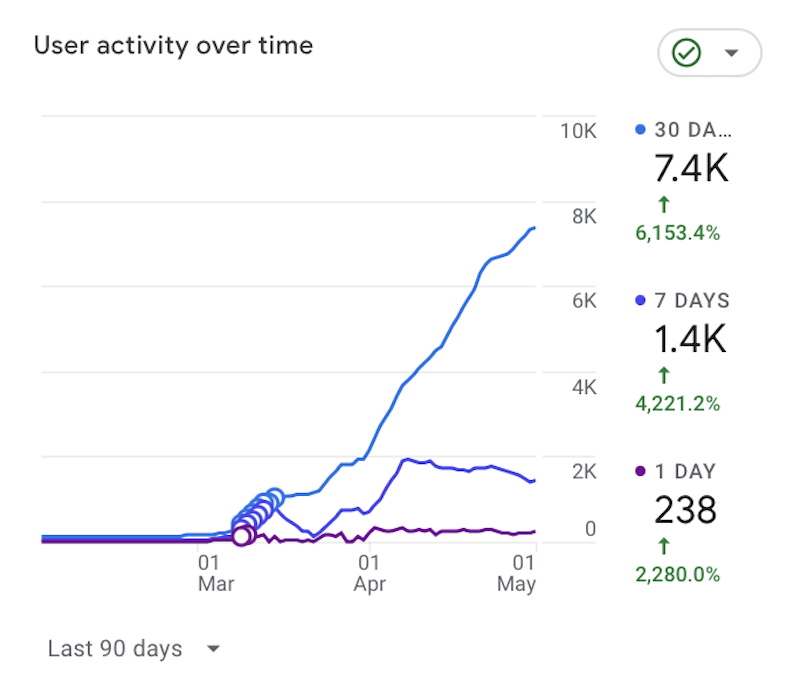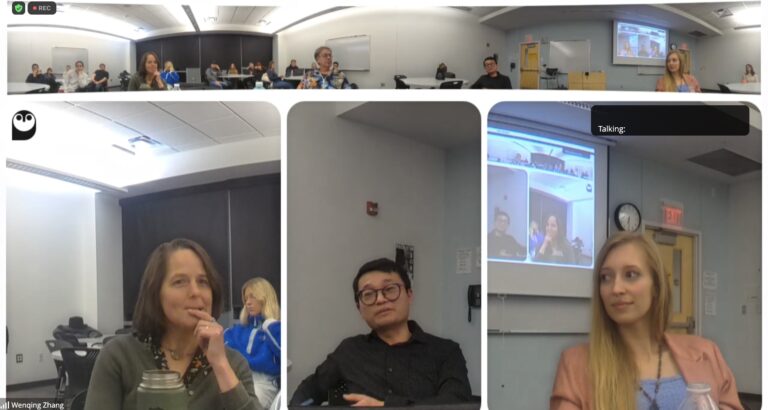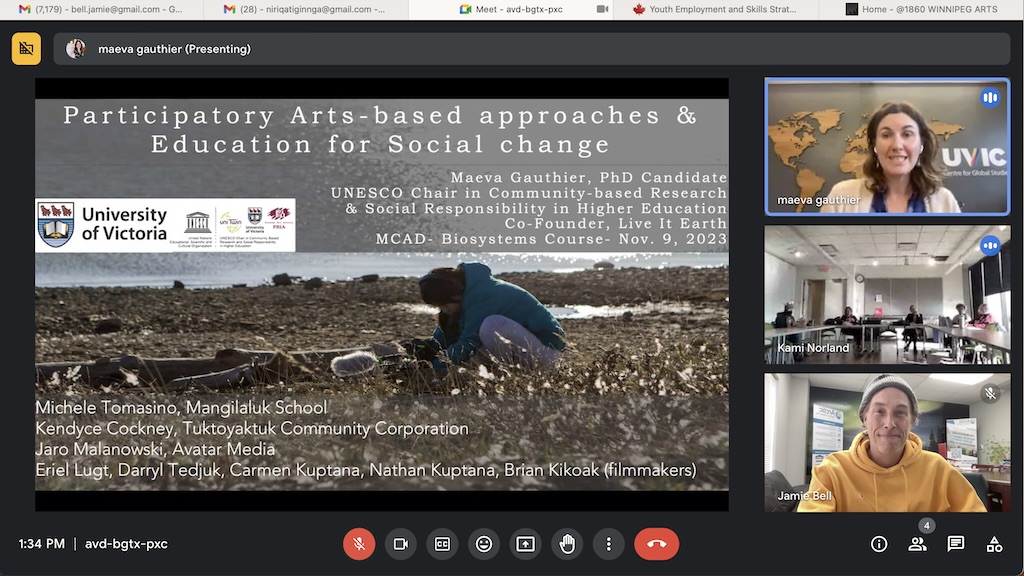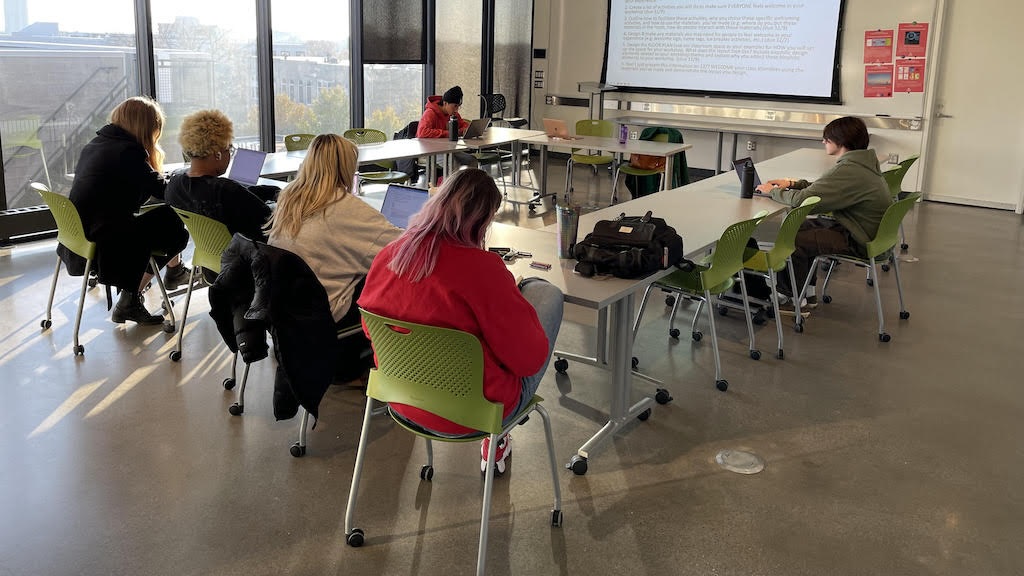ESTABLISHING
NIRIQATIGINNGA
Towards a Framework for Northern Food Systems Innovation
This developmental pilot project supports Indigenous early career exposure and cultural entrepreneurship capacity building for the Manitoba agri-food and agriculture sectors.
Click here for the latest project news and information on upcoming events.
Enhancing Indigenous Food Systems - A pilot project
Towards a Framework for Northern Food Systems Innovation
This pilot program was successfully completed from May 2023 – June 2024.
This arts and research collective is an outcome of a one-year pilot program called Niriqatiginnga, which means “come eat with me” in Inuktitut. The project was designed to address issues of food insecurity with northern Indigenous communities by exploring highly collaborative approaches to engage a range of stakeholders such as farmers, food producers, and systems innovators.
Niriqatiginnga was designed to be an experimental and emergent pilot program, co-developed from the ground up with little to no starting resources. A project goal was to explore co-developing a prototype program, which could be replicated for urban, rural and remote areas.
The project explored traditional knowledge, technology development and data-driven approaches to address northern food insecurity. It explored the need for capacity building strategies and identified skills needed to capture new, emerging market opportunities aimed at Manitoba and regional Indigenous food sector businesses. It also encouraged evidence-based policy dialogues, process recommendations leading to new opportunities for northern supply chain research.
In December 2023, the pilot program component was approved for funding from the Sustainable Canadian Agriculture Program – Indigenous Agriculture and Food Systems program with Manitoba Agriculture. In April 2024, project activities were also supported with funding from the Innovation, Science and Economic Development Canada Indigenous Intellectual Property Protection Program. In May 2024, the Youth, Arts and Media Team received funding from Agriculture Canada and the Government of Canada’s Youth Employment Skills Program.
About the Project
Empowering Indigenous Food Sector Entrepreneurship
Initial consultations and the results of prior research showed a strong need to develop capacity for arts-based and participatory, community-led and data-driven approaches where primary stakeholders, Northern and Indigenous communities, youth and Elders could be more actively involved in addressing and enhancing northern food systems.
Community engagement began July 2023 in Winnipeg and was ongoing throughout the pilot phase. Using prior participatory and co-designed approaches, the team engaged numerous key stakeholders across multiple sectors, including: First Nations, Inuit and Red River Metis youth, knowledge keepers and Elders from several Manitoba and Kivalliq Nunavut communities, plus local and regional food producers, entrepreneurs and businesses, northern community programs, government and academia.
In-depth meetings, round table group discussions and informal consultation sessions were employed from September 2023-June 2024 to gather valuable insights. These diverse perspectives will be integrated into the next iteration of the program to ensure the goals and outcomes remain achievable, sustainable and aligned with community and stakeholder priorities.
Advancing Economic Reconciliation with Indigenous Peoples: The 2023-2024 pilot program was co-developed to align with the Framework to Build a Green Prairie Economy. It was grounded in respect for the rights of First Nations, Inuit and Métis Peoples of the Prairies to set their own economic priorities and pursue their visions for economic prosperity. Post pilot, expanding on these initial conversations to include a variety of voices is one way to contribute towards growing a green economy that works for everyone.
Strengthening Relationships
Moving forward together to build resilient and thriving northern food systems will see continued, meaningful engagement with partners and stakeholders under this framework. Changing how we engage with each other, and how we work together is, in itself, a major objective.
2023-2024 Project Activities
Year One: Establishing the Niriqatiginnga Project
Niriqatiginnga was initiated as an Indigenous-led pilot project, co-designed with a wide range of industry and cross-sectoral stakeholder input, including: farmers, food producers, arts and culture, academia, government and food systems innovators, youth, Elders, local and northern Manitoba food sector businesses.
Niriqatiginnga’s foundational first year explored data-driven and evidence-based approaches to addressing northern food insecurity. It builds directly on the results of prior projects supported over the last six years, including: the US National Science Foundation, Minneapolis College of Art and Design, the University of Minnesota Duluth, the Canada Council for the Arts, Manitoba Arts Council and the ArcticNet Network Centre of Excellence.
Using participatory research, emergent design, lean start-up methodologies and approaches similar to a ‘living lab’ concept, the Niriqatiginnga pilot explored Manitoba supply chain optimization and research opportunities. A key outcome of this pilot program was to design and establish the foundations for a future Indigenous Food Entrepreneurship Lab. It also developed new pathways to climate entrepreneurship for the food sector.
The first year pilot project also saw youth conceptualize a prototype marketplace and online framework for advancing economic reconciliation through food sector entrepreneurship, technology adoption and innovation skills development.
This highly-successful pilot project was made possible with support from the University of the Arctic, Minneapolis College of Art and Design, the Community Based Research Lab at the University of Victoria, the Labovitz School of Business and Economics at the University of Minnesota Duluth.

Learning from the Past, Present and Future:
The 2023-2024 pilot project included learning about microeconomics and supply chains from the past, present, and future.
- The “Past” explored the cultural and trading history of northern Indigenous communities through Winter City Stories.
- For the “Present,” the project explored the increasingly inequitable realities of northern food supply chains and identified opportunities to further study the extent of purchase power parity.
- In the “Future” subproject, the pilot project was positioned to grow and sustain a healthy grassroots-driven ecosystem for Indigenous agri-food climate entrepreneurship through traditional trade and new technologies.
Engaging with Community
2023-2024 Project Goals
Niriqatiginnga worked to create meaningful and enhanced local and regional collaboration, working across northern, rural and urban centers. The project’s research activities also explored approaches to analyze northern food sales and shipping.
- Quantitative data analysis is needed to use descriptive statistics (ie: means and standard deviations) to describe changes in access to fresh, healthy food, food security, and economic impacts.
- Qualitative data is needed for content analysis to identify, measure and communicate themes related to reducing food insecurity.
- A three-year strategic plan is being developed. Its purpose is to inform measurable best practices to address northern food insecurity and policy recommendations; and activities supporting new product creation.
- Market expansion and sectoral development activities intersected with community food literacy, cultural and creative entrepreneurship research, skills development and training.

Arts-Based and Participatory Organizational Development
Niriqatiginnga explored traditional knowledge, technology development and data-driven approaches to address northern food insecurity; capacity and skills needed to capture new, emerging market opportunities for Manitoba; and encouraged evidence-based policy and process recommendations for more efficient and competitive northern supply chains.
Advancing Economic Reconciliation
Growing Food Sector Entrepreneurship
Niriqatiginnga worked to incubate Indigenous early career exposure, cultural entrepreneurship training and capacity building for the Manitoba agri-food and food production sectors.
Impacts and Outcomes
The first year pilot project aimed to have impacts ranging across the Manitoba agri-food and food sectors. Demands on food security programs in several northern communities is high, and while there are great ideas, a growing lack of resources, capacity and infrastructures makes it difficult for many communities and partners to implement or sustain programs.
Food insecurity is a critical issue requiring urgent attention. Support is needed to facilitate connecting producers and businesses with northern community programs and optimize supply chains.
Improving community capacity and market expansion opportunities:
The program builds capacity to develop and sustain new partnerships for market expansion. Outcomes saw increased relationship building and trust in government agencies and with NGOs, and deepened positive relationships with community and agri-food/food industry businesses. Outcomes included improved outreach and collaboration with community stakeholders across the North and South, and across the agri-food industry as a whole.
Improving capacity for Impact measurement and evaluation:
Using qualitative and quantitative data, robust metrics and evaluation frameworks were conceptualized to measure impacts on food insecurity, community health, and economic reconciliation. There was also increased capacity to sustain ongoing data collection, analysis and reporting, and for training community members to solicit feedback and effectiveness.
Increasing community and industry advocacy for policy change:
This outcome saw improved capacity for collaboration on future research, and increased advocacy for policy changes at the local, regional, and national levels.






